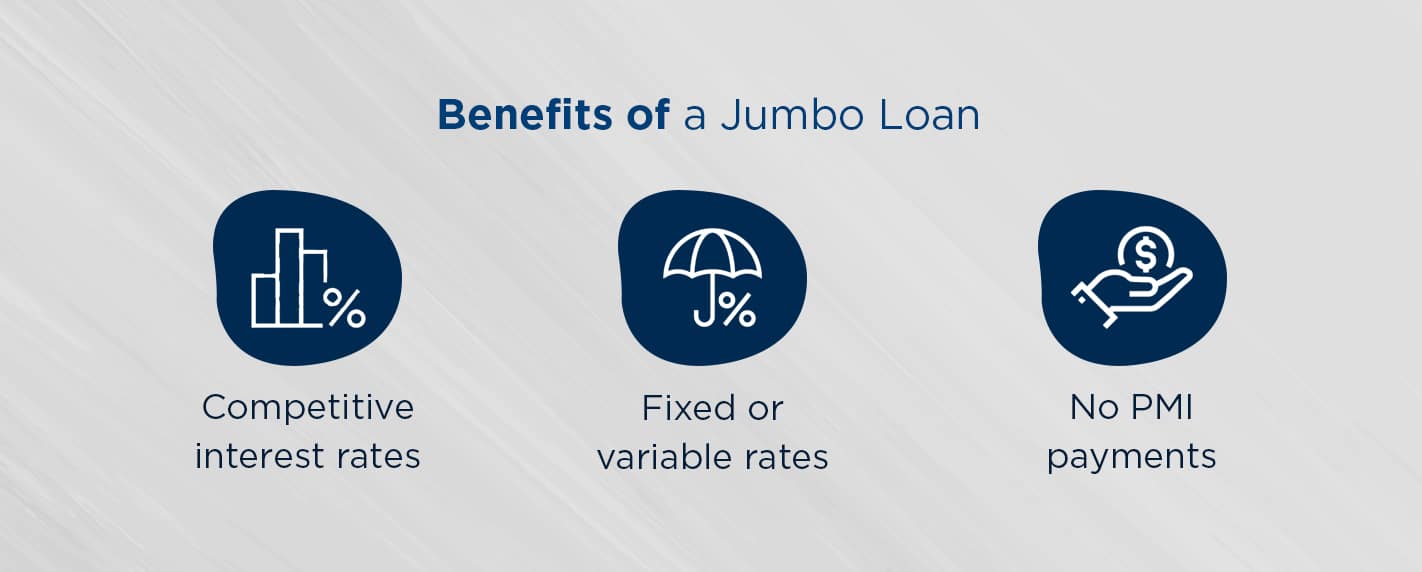Jumbo Loan: Tailored Mortgage Solutions for High-Income Borrowers
Wiki Article
Browsing the Jumbo Lending Landscape: Important Insights for First-Time Homebuyers
Navigating the intricacies of big fundings offers an one-of-a-kind set of challenges for first-time buyers, particularly in a developing genuine estate market. Recognizing the essential qualification requirements and potential benefits, alongside the drawbacks, is critical for making notified choices. Furthermore, developing a strong economic strategy can significantly enhance your prospects.Recognizing Jumbo Lendings

Due to the fact that big loans are not backed by government-sponsored entities, they carry various underwriting criteria and need even more detailed monetary documentation. This distinction can lead to higher passion rates contrasted to standard lendings, given the raised threat to lending institutions. Jumbo car loans likewise use distinct benefits, such as the capability to finance higher-value buildings and possibly more versatile terms.
Newbie property buyers need to also realize that protecting a big financing typically necessitates a bigger deposit, usually ranging from 10% to 20%. In addition, borrowers are usually anticipated to show strong credit reliability and a steady earnings to certify. Recognizing these nuances can empower new homebuyers to make educated choices when exploring big financing alternatives in their pursuit of homeownership.
Qualification Needs
Safeguarding a big lending calls for meeting certain qualification requirements that differ considerably from those of conventional lendings. Unlike standard loans, which are usually backed by government-sponsored entities, big loans are not guaranteed or guaranteed, leading to more stringent requirements.Furthermore, borrowers must demonstrate a robust financial profile, which consists of a reduced debt-to-income (DTI) proportion, normally no higher than 43%. This ensures that debtors can manage their month-to-month payments together with various other monetary responsibilities.
Additionally, most lenders require substantial documentation, including proof of earnings, asset declarations, and income tax return for the past two years. A substantial deposit is also necessary; while standard car loans might permit deposits as low as 3%, big finances usually require at the very least 20%, relying on the lender and the financing quantity.

Advantages of Jumbo Car Loans
For numerous novice property buyers, jumbo financings use distinctive advantages that can assist in the trip toward homeownership. Among the main benefits is the ability to finance residential properties that surpass the adhering car loan limits established by government-sponsored entities. This flexibility enables purchasers to access a broader series of high-value residential or commercial properties in competitive property markets.Furthermore, jumbo finances this link frequently feature eye-catching rates of interest that can be less than those of standard lendings, especially for debtors with solid credit history accounts. This can lead to considerable financial savings over the life of the car loan, making homeownership more economical. Big loans commonly enable for higher funding amounts without the demand for private home loan insurance coverage (PMI), which can additionally decrease monthly settlements and general expenses.

Prospective Disadvantages
Several possible homebuyers may discover that big car loans included significant drawbacks that necessitate mindful factor to consider. Among the primary concerns is the strict credentials criteria. Unlike adjusting fundings, jumbo finances usually need higher credit ratings, frequently exceeding 700, and substantial income paperwork, making them much less accessible for some borrowers.Additionally, jumbo loans typically include greater rate of interest contrasted to traditional fundings, which can lead to enhanced regular monthly repayments and general loaning costs. This premium might be especially challenging for first-time property buyers who are currently browsing the financial complexities of acquiring a home.
One more notable downside is the larger deposit requirement. Lots of loan providers anticipate a minimum deposit of 20% or more, which can posture an obstacle for buyers with limited financial savings. The lack of government backing for jumbo loans leads to less positive terms and problems, raising the threat for lenders and, consequently, the loaning prices for house owners.
Lastly, market variations can substantially affect the resale worth of premium properties financed with jumbo finances, adding an element of economic unpredictability that newbie property buyers may find challenging.
Tips for First-Time Homebuyers
Navigating the intricacies of the homebuying procedure can be frustrating for new purchasers, specifically when taking into consideration big loans (jumbo loan). To streamline this journey, sticking to some vital methods can make a substantial distinctionFirst, inform on your own on jumbo fundings and their specific requirements. Comprehend the different lending standards, including credit history, debt-to-income proportions, and deposit expectations. Generally, a minimum credit rating of 700 and a down payment of at the very least 20% are essential for approval.
Second, over at this website engage with an educated home loan expert. They can give insights customized to your financial circumstance and assist you browse the complexities of the big finance landscape.
Third, think about pre-approval to enhance your getting setting. A pre-approval letter signals to sellers that you are a major customer, which can be useful in open markets.
Last but not least, do not overlook the value of budgeting. Aspect in all costs associated with homeownership, consisting of property taxes, maintenance, and homeowners' insurance. By following these tips, newbie customers can approach the jumbo lending procedure with better confidence and clearness, improving their chances of effective homeownership.
Verdict
In final thought, browsing the jumbo funding landscape calls for a detailed understanding of qualification standards, benefits, and prospective downsides. Eventually, complete preparation and education regarding jumbo loans can lead to even more enlightened decision-making in the homebuying procedure.When navigating the complexities of the housing market, comprehending big fundings is vital for new property buyers intending for buildings that go beyond conventional loan limitations. Big financings are non-conforming lendings that usually surpass the adjusting lending limitation set by the Federal Real Estate Financing Company (FHFA)In addition, big finances frequently come with attractive rate of interest prices that can be click here for info lower than those of conventional financings, specifically for customers with solid credit scores accounts. Big financings normally allow for greater car loan amounts without the demand for exclusive home loan insurance (PMI), which can further reduce regular monthly payments and overall prices.
Unlike adjusting fundings, jumbo loans usually call for higher credit history scores, often surpassing 700, and considerable income paperwork, making them much less available for some borrowers.
Report this wiki page